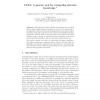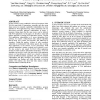46 search results - page 4 / 10 » Computational Soundness of Formal Indistinguishability and S... |
RTA
2009
Springer
15 years 6 months ago
2009
Springer
Reasoning about the knowledge of an attacker is a necessary step in many formal analyses of security protocols. In the framework of the applied pi calculus, as in similar languages...
93
Voted
SEFM
2007
IEEE
15 years 6 months ago
2007
IEEE
We give a formal account of a calculus for modeling service-based systems, suitable to describe both service composition (orchestration) and the protocol that services run when in...
109
click to vote
WWW
2004
ACM
16 years 26 days ago
2004
ACM
Security remains a major roadblock to universal acceptance of the Web for many kinds of transactions, especially since the recent sharp increase in remotely exploitable vulnerabil...
SAS
2007
Springer
15 years 6 months ago
2007
Springer
Variables in programs are usually confined to a fixed number of bits and results that require more bits are truncated. Due to the use of 32-bit and 64-bit variables, inadvertent ...
TLDI
2009
ACM
15 years 9 months ago
2009
ACM
Type-and-effect systems are a natural approach for statically reasoning about a program’s execution. They have been used to track a variety of computational effects, for example...


